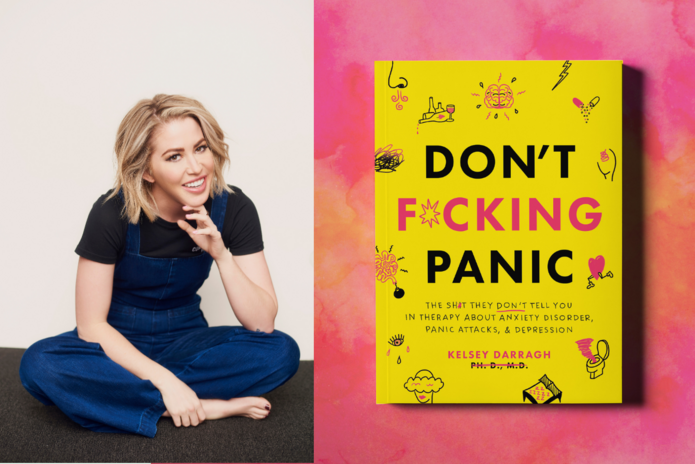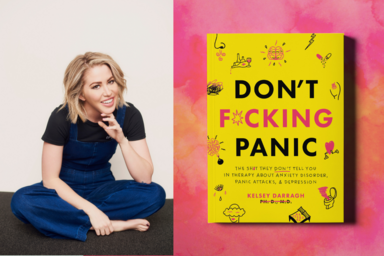Kelsey Darragh, best known for her work as a producer at Buzzfeed and as co-host of the E Network’s series Dating: No Filter has a debut book fresh off the presses. With a title like Don’t F*cking Panic; The Sh*t They Don’t Tell You in Therapy About Anxiety Disorder, Panic Attacks and Depression it’s sure to draw attention.
Darragh went into the writing process with exactly that in mind. She wanted Don’t F*cking Panic to be different. “You’re not just reading a memoir about my fucked up life,” she explains. “It’s something you can get lost in, that you can write in, that you can tear out, color on. There’s exercises so you can get that useful, hands-on material, but if you don’t really feel like diving into your own shit that day, you’ve got my monologues and anecdotes and personal essays instead.”
Don’t F*cking Panic dives deep into the world of mental health disorders, in a way you don’t see every day. “We’re saying and talking about things that mainstream media and pop culture don’t talk about, and I’m super proud of that,” Darragh says. There are some things you feel like you just can’t talk to your doctor about, Darragh notes, “Like the anxiety shits.” Raise your hand if you experience this on the regular but don’t talk about it, especially not with your doctor. Yeah, I thought so. Thanks to Darragh, you don’t have to feel like you’re crazy for when things like this happen.
sneak peek at my book DON’T F*CKING PANIC avail for pre order now https://t.co/MzlnhYglDT pic.twitter.com/HBCZPeHKQ5
— DONT F*CKING PANIC preorder now! ??✨? (@kelseydarragh) September 10, 2020
Feeling better about exploring your own mental health
Darragh hopes people struggling with mental health will turn to books like Don’t F*cking Panic as a way to learn more about themselves and their disorders. Darragh’s own journey with mental health began with lots of reading, but when she dove into the material on anxiety, panic and depression, she found that what existed wasn’t really “millennial friendly.” So, in her quest to write the book she wished she would have had, Darragh came up with the idea to help the reader “build a toolbelt of exercises” to learn how to cope with their struggles in an approachable way.
“It felt like, obvious, you know, to have it be a book that the reader can learn about themselves in,” she says. “Otherwise, I feel like just sharing my struggles wasn’t really enough.” Hence why she included exercises like (spoiler) a connect the dot activity that ends up as a picture of Ryan Gosling with a bunny. As she explained to me, it’s not medical or proven. “It’s just something I find to be a calming image,” she admits, and to that I, too, can relate.
One of the most refreshing things about Kesley is that she’s not touting this book as the end-all, be-all to curing mental health disorders, because she knows she’s not a medical professional and, more importantly, because the one thing she’s discovered on her mental health journey is that mental health disorders aren’t something to be cured. And although Darragh is open about not being a medical professional, that doesn’t discount the years of experience she’s had with anxiety, panic, depression and the non-linear healing process. “I have seen every which way kind of therapist and doctor that’s out there – psychiatrists, psychologists, hypnotherapists, crystal healers, acupuncturists – so [the book] really is giving you a diverse range of ways to feel better.”
That being said, Darragh did have to be mindful when writing, because she didn’t want to name a medicine or product that worked for her and have people flock to it for relief without doing the proper due-diligence. “I had to be careful about talking about medication in the book,” she explains, “because I’ve had such a love-hate relationship with it that I wanted to make sure people understood that sometimes medication is absolutely the answer, and sometimes it’s absolutely not.” And controversiality of the subject aside, Darragh believes we could all do a bit better with praising western medicine, as it has helped so many on the path to healing.
Creating a supportive environment
Speaking of praise, Darragh had very kind things to say about her time at Buzzfeed, an environment which helped boost her confidence in being open about her mental health struggles. So when she decided to write a mental health book, it didn’t feel taboo. “It just felt like another day at the office,” she says. To this day, Darragh saturates her social media accounts with content about her journey of healing. For example, she captioned a recent Instagram post as “Pretending I’m Emily In Paris while actually being Kelsey in Depression” and another as,“I’m in Spain rn. The S silent tho.”
Darragh’s honesty isn’t always upbeat, but that’s not the point. Instead, it’s real. And with this openness, her followers get the chance to learn the frequency with which she deals with these disorders – and hopefully they find assurance that whatever they’re going through is valid, too. But the wellness community as a whole still has a long way to go. “We really only give space in the wellness community to those white yoga girls, and I think it projects a very unrealistic image of what getting better looks like,” she says. “I would love to see more diverse voices and bodies speaking about mental health, especially Black men because they are the most underrepresented, and conversely most affected by mental health struggles.”
Turning to social media for advocacy
Advocating for change like this in the wellness community hasn’t been the only activism Darragh has involved herself in lately. She’s become incredibly passionate about raising awareness about the treatment of mentally ill children in the juvenile detention system, specifically with the case of Saraya Rees, a teenager who fell into a psychosis after being taken off of antidepressants cold turkey, about whom Darragh is currently directing a documentary.
To social media’s credit, Darragh wouldn’t have even known about Saraya without the help of Tik Tok, where she first heard about the case. After that, she reached out to the family on Facebook. “I asked how I could help amplify, and it went from just helping to repost some of the information, to weekly telethons to the local governor, to deciding we were going to do a documentary about the injustices of the juvenile prison system.” For more info about 13 year-old Saraya’s wrongful imprisonment as the consequence of a mental health crisis, check out justice4saraya.com and follow Darragh’s Instagram for updates on the story.
Social media certainly has its moments when it comes to mental health. The concept of the ‘ideal,’ whether it be a material possession, body type, ethnicity or career, is something that social media has amplified in ways we don’t yet understand. Who knows what the impact of our generation’s obsession with our internet lives will be, or how it will change us as we grow older.
But for as much as platforms like Instagram, Facebook, Tik Tok and Snapchat have contributed to the development and amplification of mental health disorders, they have also provided people like Darragh with ways to speak about their struggles openly, and in 2020, we’ve seen the great power of social media as a catalyst for change. As Darragh puts it, “We’re the generation of exposing injustice, and we wouldn’t be able to do that without the connection and visibility that social media brings us.”
I’ll let you weigh the pros and cons yourself, but one thing’s for certain: social media is powerful when it comes to mental health. So let’s take Darragh’s impassioned lead, and join her in working towards embracing more open, honest and diverse voices in the mental health community. And no need to panic if you’re not quite ready to become a “mental health loudmouth of your own.” Darragh wants you to know, “There is a wide community ready to help and accept and love and nurture you, whenever you’re ready.”

